Investment in scaling up global production of renewable fuels in the pursuit of the aviation industry’s Net Zero emissions target was at the forefront of discussions at this year’s Aviation Carbon conference in London. With Europe introducing from January sustainable aviation fuel (SAF) blending mandates, as well as monitoring requirements on aircraft non-CO2 impacts, industry concerns were raised over the complexity and cost of new regulations facing airlines. IATA’s SVP Sustainability and Chief Economist, Marie Owens Thomsen, criticised fossil fuel subsidies and the lack of investment by oil majors in the energy transition. Outcomes from the recent COP29, which have positive implications for ICAO’s CORSIA carbon scheme, and raising finance for SAF development, were central to a speech by the UN agency’s Secretary General, Juan Carlos Salazar.
As noted by Abdul Wahab Teffaha, Secretary General of the Arab Air Carriers Association during Aviation Carbon’s opening panel, one of the bugbears of airline associations is the prospect of a proliferation of regional mandates and schemes on the use of SAF by airlines. For example, he pointed to the EU’s and the UK’s SAF blending mandates that come into force from January 2025. The resulting “patchwork” would lead to an increase in costs and complexity for airlines, argued Teffaha.
Speaking to GreenAir after his speech, Salazar said that ICAO respects the sovereignty of any region if they chose to create their own schemes and regulations but stressed that the clear mandate given to ICAO was to address aviation’s carbon emissions at a global level and this resulted in CORSIA. “It is the only way for the international community to address CO2 emissions,” he noted.
For Salazar, the work being done by ICAO on aviation emissions is “a very solid basis to achieve our goal of net zero emissions by 2050…it is the way forward,” he said. “ICAO is steadily implementing CORSIA, and we are now moving from the voluntary to the mandatory phase. We are confident that the international community will continue its steady work on CORSIA and emission reduction policies as we create a very solid framework for the further advancement of the LTAG.”
As Salazar reminded delegates: “The landmark adoption of a long-term global aspirational goal (LTAG) of net-zero carbon emissions by 2050 during the 41st Session of the ICAO Assembly in 2022 settled an ambitious target for our industry. This goal recognises the urgent need to address climate change while acknowledging the vital role of aviation in global development.”
In addition, he added: “The success of the Third ICAO Conference on Aviation and Alternative Fuels held last year in Dubai, the CAAF/3, with its adoption of a Global Framework for SAF, Lower Carbon Aviation Fuels (LCAF),and Cleaner Energies, marked another significant step forward, setting out four key building blocks: Policy and planning; Regulatory framework; Implementation support; and Financing.
“The global target to achieve a 5% CO2 emissions reduction by 2030 through the use of SAF, LCAF and cleaner energies is also an ambitious, but achievable target with concerted effort. And the recently approved roadmap by the ICAO Council will guide our implementation activities, starting with the allocation of financial and human resources,” noted Salazar.
Obtaining the huge sums needed to develop a SAF industry was a constant theme during Aviation Carbon. According to Salazar: “Financing will be paramount for achieving our collective goals for a net zero future, this was the central focus of the discussions at COP29 last week.” This year’s UN climate change conference, COP29, took place the week prior to Aviation Carbon in Baku, Azerbaijan.
“The clean energy transition will require substantial financing. I am pleased to share that the ICAO Finvest Hub is well under development and our ambition is that it will be a crucial platform to facilitate investment partnerships, particularly for countries and regions that do not yet have SAF production capabilities,” explained Salazar.
“Our steady progress with the Finvest Hub is evidenced by our recent agreement with the International Renewable Energy Agency (IRENA). This co-operation, signed at the G20 Energy Ministerial meetings in Brazil last month, will significantly boost financing opportunities for sustainable aviation fuels and other cleaner aviation energy projects.
“The ICAO Finvest Hub will connect aviation decarbonisation projects with potential public and private investors, and beyond this matchmaking function, its value will lie in the collaboration between ICAO and financial institutions to fund projects,” said Salazar.
“The Finvest Hub is also an integral part of ICAO’s capacity-building and implementation support activities. More than 200 States and organisations are now part of ICAO’s Assistance, Capacity Building, and Training programme for SAF, known as ACT-SAF. This initiative provides crucial support for SAF development and deployment, offering training, feasibility studies, business implementation reports, support for SAF certification and policy development, and implementation of specific SAF projects for States,” Salazar told delegates.
“As we speak, more than 20 SAF feasibility studies and business implementation reports are under development. ICAO has a pivotal role in providing a harmonised, independent and robust regulatory framework for the environmental certification of cleaner aviation energies.
“I am pleased to inform you that currently 48 feedstocks are recognised under CORSIA. As States prepare their national policies for the aviation clean energy transition, adhering to this framework will ensure a level playing field for considering the environmental benefits of such fuels.
“Additionally, CORSIA continues as a crucial element in our basket of measures to reduce aviation’s carbon footprint.,” said Salazar. “Since 2019, all 193 ICAO member states are implementing the scheme’s monitoring, reporting and verification system. In addition, I’m delighted to acknowledge that 129 member states have confirmed their voluntary participation in the scheme subject to offsetting requirements in 2025, and we want more states to participate in future years.
“At its last session, the ICAO Council approved four additional programmes as eligible for CORSIA, ensuring that sufficient emissions units could be available for use in the scheme’s first phase,” said Salazar. The buying and selling of eligible emissions units through the carbon market is a crucial part of the functioning of CORSIA, but their availability has been limited up until now.
On this topic Salazar added: “The recent adoption of Article 6 of the Paris agreement at COP29 provides additional clarity in the way CORSIA eligible units can be authorised and cancelled, ensuring no double counting and stability for the voluntary carbon markets.”
Little control over fuel costs
IATA’s Marie Owens Thomsen, offering the airline perspective at Aviation Carbon, mused that as “complete price-takers” to the fuel suppliers, airlines have little control over what represents some 30% of their total costs. “The fantasy I harbour is that airlines can progressively take control over our own destiny and in-source more of their fuel supply,” she said. Her point was partly intellectual, but investing in jet fuel production is something various carriers are believed to be interested in.
She also noted that because aviation only takes 8% of global refined fossil fuel capacity, “the oil companies don’t need us for their profit optimisation.”
The health of the global economy, despite geo-political turmoil in the Middle East and war in Ukraine, is “strikingly stable”. With growth of 3.2% over the past two years and similar forecast into 2025 the economic backdrop is “super healthy”. This economic growth has seen oil prices dropping. “Anything under $80 a barrel is supportive of the global economy,” she noted.
However, Owens Thomsen questioned if today’s relatively low oil prices disincentivise investment in the move to renewable energy. They discourage the oil majors, she said, which have seen their stock prices rise on the back of lower oil prices, from investing in the energy transition. At the same time, lower oil prices have seen the stock prices of renewable energy industries “tank”.
“COP29 showed that the energy transition is a global problem. People need to understand that aviation is not a beast to be singled out,” she stated. “The real task is to switch from fossil fuels to renewable energies and we need to make money flow to the renewable energy industry. Imagine a world with ample energy supply that is cheap and renewable.”
One of the frequent questions at the two-day conference was whether the fossil fuel industry is investing enough in the energy transition. The answer was often it is not, mainly because it is not in its interests today to do so.
Owens Thomsen pointed to one of the impediments she believes is holding things back: the multi-billion-dollar subsidies given to the fossil fuel industry. “One of the discussions I struggle most to have is a conversation on fossil fuel subsidies,” she said.
This year’s Aviation Carbon 2024, co-organised by GreenAir, attracted a record 450 delegates from around 70 countries.
Photo (Shai Dolev): ICAO Secretary General Juan Carlos Salazar delivers the closing speech at Aviation Carbon 2024
ICAO has celebrated its 80th anniversary that marks the signing of the Convention on International Civil Aviation with an event at the Hilton Chicago Hotel, formerly The Stevens Hotel, where the Convention was adopted towards the end of World War II and ICAO was born. Under the theme of ‘Safe Skies, Sustainable Future’, on December 5 ICAO held an extraordinary session of its governing Council, followed by high-level roundtable discussions with representatives from States, industry, regional organisations, academia, NGOs and the United Nations. A broadcast of the event is available on ICAO TV.
To commemorate the anniversary, 11 major industry associations have signed a joint declaration. “It celebrates the achievements of eight decades of progress made possible by the foresight of the Chicago Convention and through the global set of standards set by ICAO, not just in terms of safety and security – making aviation the safest form of transport globally – but as an enabler of global connectivity, allowing this industry to generate $4.1 trillion in global economic activity and support 86.5 million jobs worldwide,” commented Haldane Dodd, Executive Director of the Air Transport Action Group (ATAG).
“As we face the challenges of our time, from achieving net zero emissions to ensuring equitable access to air transport, the aviation sector stands united in its commitment to innovation and collaboration, working hand-in-hand with ICAO to shape a future and set the course for the next 80 years.”
ATAG has just released a global report, ‘Aviation: Benefits Beyond Borders 2024’, which provides an analysis carried out by Oxford Economics of the economic and social benefits of aviation at a national level in 85 countries, as well as 14 major regions/groups. It also looks at the industry’s environmental progress in reducing its ecological impact and the climate targets that the sector is pursuing in the short, medium and long term. “For aviation to grow sustainably, it is vital that the industry balances the advantages of growth in air travel with the responsibility to pursue climate change action,” says the report.


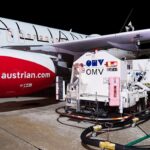
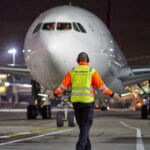
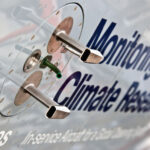



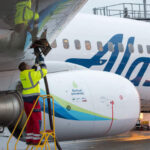
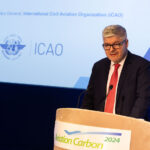



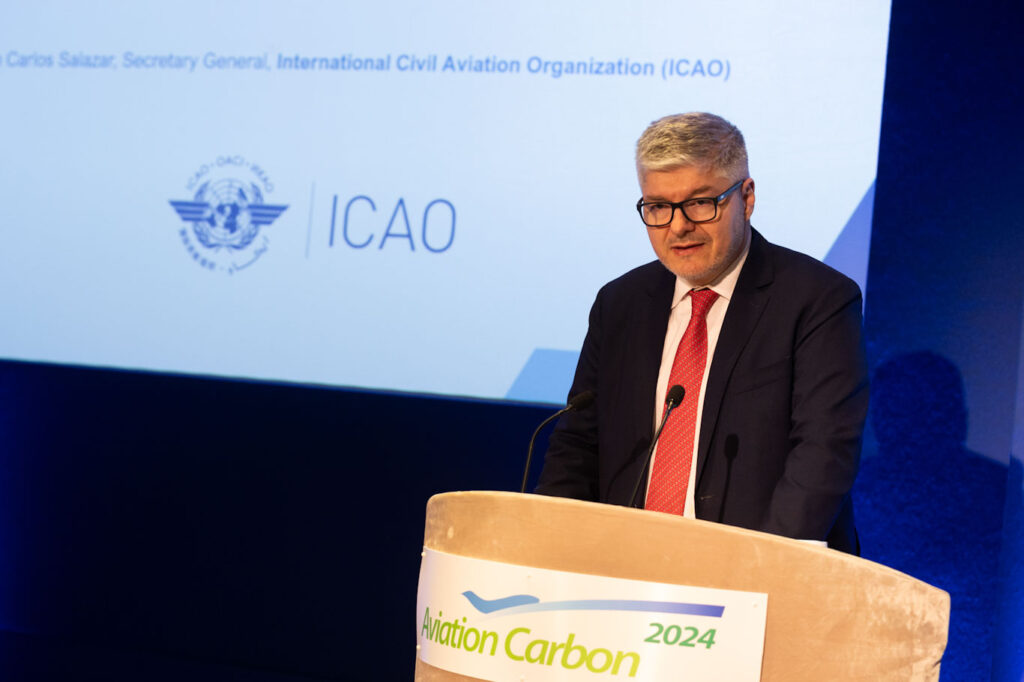


More News & Features
Progress on decarbonising the airline sector has been slow this year, says IATA chief
EASA releases status report on Europe’s SAF production and readiness to meet blending targets
UK government sets out new Jet Zero focus and launches consultation on CORSIA global emissions scheme
European and US research programmes expand to better understand aviation non-CO2 climate effects
T&E joins aviation and climate scientists in urging action to reduce warming contrails
New study highlights differing strategies and barriers to decarbonising aviation in UK and Europe